13 April
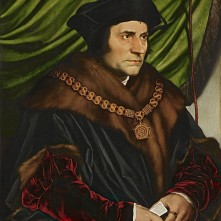
Sir Thomas More
1557 – Death of John Brydges, 1st Baron Chandos of Sudeley, landowner, soldier and Lieutenant of the Tower of London. He died at Sudeley Castle. When Lady Jane Grey was in the Tower, she gave him her English prayer book in which she wrote a homily for him, and when Elizabeth was in the Tower, he was accused of being too lenient with her.
1598 – Henry IV of France issued the Edict of Nantes granting the Huguenots freedom of religion in France.
1606 – Death of Richard Day, Church of England clergyman, printer and son of the famous printer John Day, who had printed John Foxe's “Actes and Monuments”. In 1578 Richard printed his own translation of “Christ Jesus Triumphant” by Foxe, and then got into trouble with his father when he started printing his father's works without his permission. His father had his printing equipment and stock seized, and Richard was forced to become a clergyman, becoming Vicar of Mundon, Essex.
1630 – Death of Anne Howard (née Dacre), Countess of Arundel, at Shifnal. She was laid to rest in the Fitzalan Chapel of Arundel Castle. Anne was the eldest daughter of Thomas Dacre, 4th Lord Dacre of Gilsand, and wife of Philip Howard, 13th Earl of Arundel. Anne was a staunch Catholic and harboured priests.
14 April
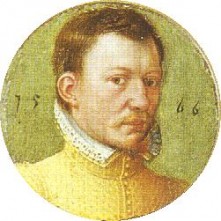
Bothwell
1565 – Birth of Edward Gresham, astrologer, astronomer and magician, in Stainsford, Yorkshire. He is known for his treatise “Astrostereon” and his astrological almanacs, published between 1603 and 1607.
1578 - James Hepburn, 1st Duke of Orkney and 4th Earl of Bothwell, died aged forty-four at Dragsholm Castle after being imprisoned and held in appalling conditions by Frederick, King of Denmark. It is said that the imprisonment caused Bothwell to go insane. Bothwell was the third husband of Mary, Queen of Scots.
1587 – Death of Edward Manners, 3rd Earl of Rutland, at Greenwich. He'd been taken ill earlier that month. He was buried on 15th May at Bottesford, Leicestershire.
1599 – Death of Sir Henry Wallop, member of Parliament and administrator, in Dublin while serving there as Treasurer-at-War. He was buried in St Patrick's Cathedral, Dublin.
15 April
1530 – Death of Gilbert Tailboys, 1st Baron Tailboys and first husband of Elizabeth (Bessie Blount), mistress of Henry VIII. He was laid to rest in South Kyme Church.
1545 – Death of Sir Robert Dymoke, champion at the coronations of Henry VII and Henry VIII. He also served in the households of Catherine of Aragon and Anne Boleyn.
1589 – Burial of Frances Radcliffe (née Sidney), Countess of Sussex and founder of Sidney Sussex College, Cambridge. She was buried in Westminster Abbey, in the Chapel of St Paul.
1599 – Robert Devereux, 2nd Earl of Essex, was sworn in as Lord Lieutenant of Ireland.
1624 – Burial of Sir John Scudamore, husband of Mary Shelton, who served in Elizabeth I's Privy Chamber, at Holme Lacy. It was alleged that Elizabeth I broke one of Mary's fingers in a temper.
16 April
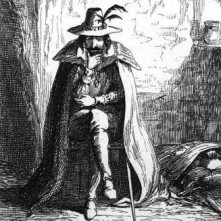
Guy Fawkes
1521 – German Protestant reformer, Martin Luther, appeared in front of Emperor Charles V at the Diet of Worms. He had been summoned to the diet to either recant or reaffirm his religious views.
1550 – Birth of Francis Anthony, alchemist, apothecary and physician. He was probably born in London and was the son of Derrick Anthony, a goldsmith. Anthony was imprisoned twice for practising as a physician without a licence, and is known for his aurum potabile (drinkable gold), made from gold and mercury, which he claimed had amazing curative powers. His works included Medicinae chymicae et veri potabilis auri assertio (1610).
1570 - Baptism of Guy Fawkes, conspirator, at the Church of St Michael le Belfrey in York.
1578 – Burial of Thomas Drant, Church of England clergyman and poet. He was part of the “Areopagus” intellectual circle at court, but also had an ecclesiastical career and was chaplain to Edmund Grindal, Bishop of London. He is known for his work on prosody (metre), and actually drew up some rules concerning it, which were mentioned by Edmund Spenser, Gabriel Harvey, Philip Sidney, Edward Dyer and Fulke Greville.
1587 – Death of Anne Seymour (née Stanhope), Duchess of Somerset and wife of Edward Seymour, Duke of Somerset and Lord Protector during part of Edward VI's reign. Anne was a reformer and a literary patron. She died at Hanworth Place and was buried at Westminster Abbey.
1595 – Death of Ferdinando Stanley, 5th Earl of Derby and literary patron. His sudden death caused rumours of poisoning and witchcraft, but nothing was ever proved. Stanley was patron of the Strange's Men company of players, which probably included William Shakespeare, and he was also a patron of poets. It is thought that he also was a poet.
17 April
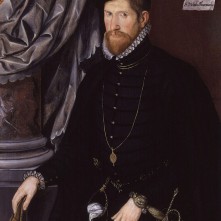
Nicholas Throckmorton
1554 – Sir Nicholas Throckmorton was acquitted of treason for being involved in Wyatt's Rebellion. The jurors were arrested straight after the trial and Throckmorton remained in prison until January 1555.
1554 – Thomas Wyatt the Younger's head was stolen in the rejoicing after Throckmorton's acquittal.
1554 – Birth of Stephen Gosson, Church of England clergyman, satirist and anti-theatrical polemicist. In 1579 he published his “Schoole of Abuse, containing a pleasant invective against Poets, Pipers, Plaiers, Jesters and such like Caterpillars of the Commonwealth”.
1568 – Birth of George Brooke, conspirator, son of William Brooke, 10th Baron Cobham and his wife Frances (née Newton). Brooke conspired with Sir Griffin Markham and William Watson to kidnap King James I and end the persecution of Catholics. The plot was called the Bye Plot, and never took place because the authorities found out about their plans. Brooke was arrested, tried at Winchester 15th November 1603 and executed on Winchester Castle green 5th December 1603.
1595 – Execution of Henry Walpole (St Henry Walpole), Jesuit martyr, in York. He was hanged, drawn and quartered. He was accused of treason on three counts "Walpole had abjured the realm without licence; that he had received holy orders overseas; and that he had returned to England as a Jesuit priest to exercise his priestly functions".
18 April
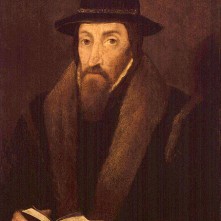
John Foxe
1540 – King Henry VIII made Thomas Cromwell Earl of Essex, just three months before he was executed after being found guilty of treason, heresy, corruption and more.
1552 – Death of John Leland, poet and antiquary, in the parish of St Michael le Querne, Cheapside, London. He was buried there. In 1547, Leland “fell besides his wits” and in 1551, his brother was granted custody of him and his possessions. Leland is known for the notebooks of his travels around England and Wales, which were published as “The Itinerary of John Leland the Antiquary” by Thomas Hearne.
1555 – Death of Polydore Virgil, Italian humanist scholar and historian, at Urbino. He was buried in the Chapel of St Andrew in the Duomo in Urbino. Virgil has been called the “Father of English History”, and his famous works include De inventoribus rerum and the Anglica Historia.
1556 – Death of Sir John Gage, military administrator and courtier, at his home, Firle Place, Sussex. He was buried at West Firle church. Gage's offices included Chancellor of the Duchy of Lancaster, Comptroller of the Household, Constable of the Tower and Lord Chamberlain.
1570 – Burial of William Herbert, 1st Earl of Pembroke, at St Paul's, beside his wife. He had died at Hampton Court Palace on 17th March.
1587 - John Foxe, the English historian, reformer and martyrologist, died aged around seventy. He is known for his book “Actes and Monuments”, commonly known as “Foxe’s Book of Martyrs”, an account of Christian martyrs throughout history, with particular emphasis on the Protestant martyrs who died during the reign of Mary I.
19 April
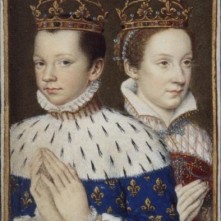
Mary Queen of Scots and Francis II
1568 – Funeral of Sir Ambrose Cave, Knight of the Hospital of St John of Jerusalem and administrator, at the Savoy Chapel. He was buried at Stanford, Northamptonshire. Sir Francis Knollys was his chief mourner.
1587 - Sir Francis Drake entered the harbour of Cadiz on the Spanish coast and led a pre-emptive strike on the Spanish fleet, destroying a number of ships (20-30) and their supplies, and causing the planned Spanish attack on England to be postponed for over a year. Drake referred to this successful attack as "Singeing the King of Spain's beard".
1601 – Hanging of James Duckett, bookseller and Catholic martyr, at Tyburn, after Roman Catholic books were found in his possession.
1608 – Sudden death of Thomas Sackville, 1st Baron Buckhurst and 1st Earl of Dorset, poet, member of Parliament and administrator, at Whitehall from a stroke suffered at the council table. Sackville's offices in Elizabeth I's reign included ambassador, Chancellor of the University of Oxford and Lord Treasurer. His literary works included the 1561 drama “Gorboduc”, written with Thomas Norton, the poem “Complaint of Henry, Duke of Buckingham” and the allegorical poem “Induction”.
1615 – Death of Laurence Bodley, Church of England clergyman and brother of Thomas Bodley, founder of the Bodleian Library. He died at the age of sixty-seven and was buried in Exeter Cathedral.


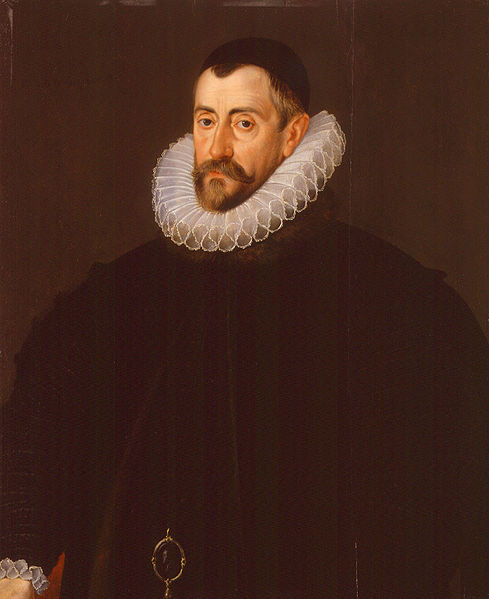
Leave a Reply